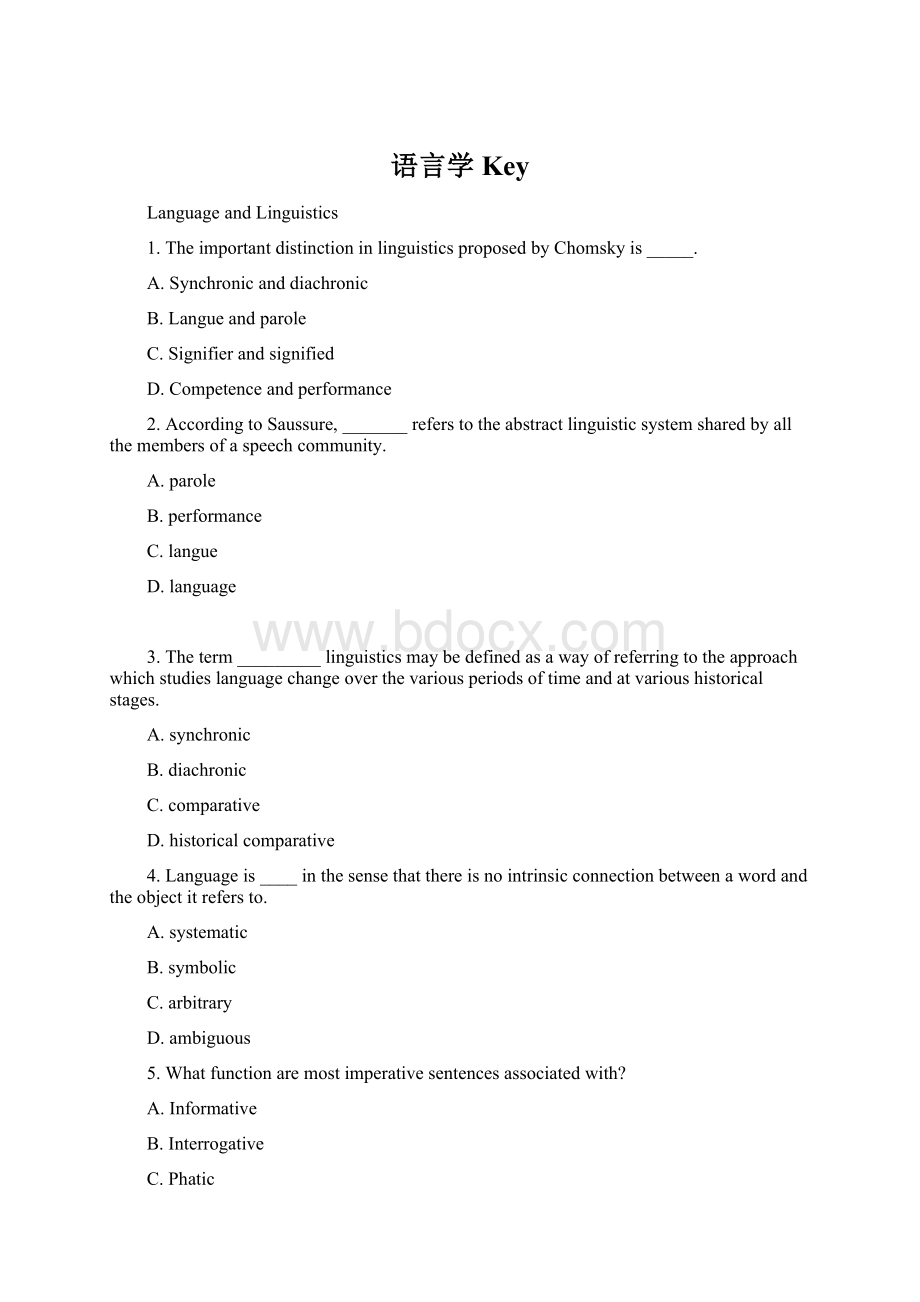语言学KeyWord文档格式.docx
《语言学KeyWord文档格式.docx》由会员分享,可在线阅读,更多相关《语言学KeyWord文档格式.docx(14页珍藏版)》请在冰豆网上搜索。

inthissense,ourlanguageis____.
A.productive
B.interchangeable
C.geneticallytransmitted
D.rule-governed
7.Languagecanrefertocontextsremovedfromtheimmediatesituationsofthespeaker.Thisiswhatwemeanby_____.
A.culturaltransmission
B.displacement
C.duality
D.productivity
8.Bydualitywemeanthatlanguagehastwosetsofstructures,oneof_______andtheotherof______.
A.surfacestructure,deepstructure
B.phonemes,morphemes
C.sounds,meanings
D.production,reception
9.AccordingtoChomsky,________istheidealuser’sinternalizedknowledgeofhislanguage.
A.competence
B.parole
C.performance
D.langue
10.Generallinguisticsisthescientificstudyof_________.
A.languageofacertainindividual
B.theGermanlanguage
C.humanlanguagesingeneral
D.thesystemofaparticularlanguage
PhoneticsandPhonology
11.Thestudyofhowsoundsareputtogetherareusedtoconveymeaningincommunicationis_________.
A.morphology
B.generallinguistics
C.phonology
D.phonetics
12.A(n)______isaunitthatisofdistinctivevalue.Itisanabstractunit,acollectionofdistinctivephoneticfeatures.
A.phone
B.sound
C.allophone
D.phoneme
13./m,n/are________.
A.fricatives
B.dentals
C.glides
D.nasals
14./w,j/belongto_____.
B.dentals
D.nasals
15.Whichofthefollowingvowelistheroundedone?
A./i:
/
B./u:
/
C./i/
D./a:
16.Thevowel/u:
/in/fu:
d/(food)isa_________vowel.
A.back
B.front
C.unrounded
D.central
MORPHOLOGY
17._______isthesmallestunitoflanguageintermsofrelationshipbetweenexpressionandcontent.
A.Word
B.Morpheme
C.Allomorph
D.Root
18._______arethosethatcannotbeusedindependentlybuthavetobecombinedwithothermorphemestoformaword.
A.Freemorphemes
B.Boundmorphemes
C.Boundwords
D.Words
19._______modifythemeaningofthestem,butusuallydonotchangethepartofspeechoftheoriginalword
A.Prefixes
B.Suffixes
C.Roots
D.Affixes
20.“-s”inthewordbooksis____.
A.aderivativeaffix
B.astem
C.aninflectionalaffix
D.aroot
Note:
root(词根)/affix(词缀),都属于boundmorpheme(粘着词素)
1.root(词根):
apartofaword;
itcanneverstandbyitselfalthoughitbearsaclear,definitemeaning;
itmustbecombinedwithanotherrootoranaffixtoformaword.(一个不能再分,再分就会失去其本义的基本形式)
词根词素可以分为自由词根词素(freerootmorpheme,e.g.rainrainyraincoat
粘着词根词素(boundrootmorpheme)
e.g.geo(theearth)+ology(abranchoflearning)geology,psychology,physiology
tele(distant,far)+visiontelevision,telegraph
transmit,permit,submit‘
maintain,contain,detain
2.Affix词缀
1)inflectional(曲折):
语法关系的标志grammaticalrelations
(number,tense,degree,case)-s,-er,不改变词性
2)derivational(派生):
在词干上加上一个词缀得到一个新词,与词性和意义有关
3.stem词干
Theexistingformtowhichaderivationalaffixcanbeadded.
Itreferstotheleftmorphemeorcombinationofmorphemeswhenoneaffixisremovedforonetime.
e.g.carelessness
21.Whichofthefollowingwordsisaderivationalone?
A.Blackboard
B.Teaches
C.Consideration
D.Books
22.Whichofthefollowingwordsiscreatedthroughtheprocessofacronym?
A.ad
B.edit
C.AIDS
D.Bobo
23.Theword“lab”isformedthrough____.
A.backformation
B.blending
C.clipping
D.derivation
24.WhichofthefollowingisNOTacompoundword
?
A.LandladyB.Greenhouse
C.UpliftD.Unacceptable
20.Nouns,verbsandadjectivescanbeclassifiedas________.
A.lexicalwords
B.grammaticalwords
C.functionwords
D.formwords
21.OpenclassofwordscanconsistofthefollowingcategoriesEXCEPT_________
A.nouns
B.verbs
C.adjectives
D.articles
22.Whichoneofthefollowingmostpossiblybelongstotheclosedclass?
A.Flower
B.Treacherous.
C.We
D.Whack
23.InflectionalmorphemesmanifestthefollowingmeaningsEXCEPT_________
A.tone
B.tense
C.number
D.case
24.Whichofthefollowingcontainsatleastaninflectionalmorpheme?
A.Possibility
B.Decision
C.Hers
D.Enable
25.________areboundmorphemesbecausetheycannotbeusedasseparatewords.
A.Roots
B.Stems
C.Affixes
D.Compounds
26.Theword“irresistible”is______________
A.acompoundone
B.aclippedone
C.ablendedone
D.aderivedone
27.Whichofthefollowingaffixdiffersfromothers?
A.–ly
B.–ness
C.–ing
D.–ful
28.Theword“Kung-fu”is_____.
A.aclippedone
B.ablendedone
C.acompoundone
D.aborrowedone
Semantics
25.Awordwithseveralmeaningsiscalled______word.
A.apolysemous
B.asynonymous
C.anabnormal
D.amultiple
26.Thepairofwords“lend”and“borrow”are___.
A.gradableopposites
B.relationalopposites
C.co-hyponyms
D.synonyms
27.Therelationshipbetween‘fruit’and‘apple’is_______.
A.homonymy
B.hyponymy
C.polysemy
D.synonymy
28.“Alive”and“dead”are______antonyms.
A.relational
B.gradable
C.symmetric
D.complementary
29.“Big”and“small”areapairof_____opposites.
A.complementary
C.complete
D.converse
6.Theword“luggage”and“baggage”are_________
A.emotivesynonyms
B.dialectalsynonyms
C.collocationalsynonyms
D.stylistic
7.Therelationbetween“begin”and“commence”is_________
A.dialectalsynonyms
B.stylisticsynonyms
C.collocationalsynonyms
D.semanticallydifferentsynonyms
8.“Fall”and“autumn”are_________synonyms
A.dialectal
B.stylistic
C.collocational
D.emotive
9._________isNOTapairofhomophones.
A.rainandreign
B.fleaandflee
C.lead[li:
d]andlead[led]
D.complimentandcomplement
10.Inthesemantictriangle,“referent”refersto_______
A.concept
B.therealworld
C.thethought
D.meaning
11.“Wise”and“cunning”areapairof_________synonyms.
12.“Wide”and“broad”areapairof__________synonyms
13.Whichofthefollowingscanbethesameformsharedbytwohomonyms?
A.Ball
B.Can
C.Bark
D.North
14.“See”and“sea”are___________
A.homophones
B.homographs
C.completehomonyms
D.polysenmicwords
15.Whatisthesenserelationbetween“learn”and“teach”?
A.Relationalantonyms
B.Complementaryantonyms
C.Gradableanonyms
D.Absoluteantonyms
16.Whatisthesenserelationbetween“pass”and“fail”?
17.:
X:
Theyaregoingtohaveanotherbaby.
Y:
Theyhaveachild.
TherelationshipofXandYis________
A.synonymous
B.inconsistent
C.XentailingY
D
:
XpresupposingY
18.“Tommy’shenlaidaneggyesterday.”presupposes__________
A.Tommyhadahen
B.Tommyhadabighen
C.AneggwaslaidbyTommy’shen
D.Theeggisnotastone.
19.“HehasbeentoTokyo”entails“_________”.
A.HehasbeentoJapan
B.TokyoisthecapitalofJapan.
C.HehasneverbeentoJapan.
D.HeisnotaJapanese.
Pragmatics
1.AccordingtoSearle,thoseillocutionaryactswhosepointistocommitthespeakertosomefuturecourseofactionarecalled_____.
A.commissives
B.directives
C.expressives
D.declaratives
2._______isdefinedasthestudyoflanguageinuseandlinguisticcommunication.
A.Pragmatics
B.Sociolinguistics
C.Neurolinguistics
D.Contextuallinguistics
3.“Wecandothingswithwords”---thisisthemainideaof______.
A.theSpeechActTheory
B.theCo-operativePrinciple
C.thePolitePrinciples
D.pragmatics
4._________refertotheutteranceofasentencewithdeterminatesenseandreference.
A.Locutionaryact
B.Illocutionaryact
C.Perlocutionaryact
D.Speechact
5.Thebranchoflinguisticsthatstudiesmeaningoflanguageincontextiscalled_______.
A.semantics
B.sociolinguistics
C.pragmatics
D.psycholinguistics
6.WhichofthefollowingisNOTthespecificinstanceofdirectives?
A.Inviting
B.Advising
C.Warning
D.Swearing
7._________actsexpressestheintentionofthespeaker.
A.Locutionary
B.Illocutionary
C.Perlocutionary
D.Speech
8.“Ididn’tstealthatring”isa_________.
A.directive
B.expressive
C.commissive
D.representatives
9.“I’msosadaboutyourwrongdoings”isa__________
A.declaration
B.expressives
C.representatives
D.commissives
10.“Handsup!
”isa________.
B.representative
D.declaration
11.“